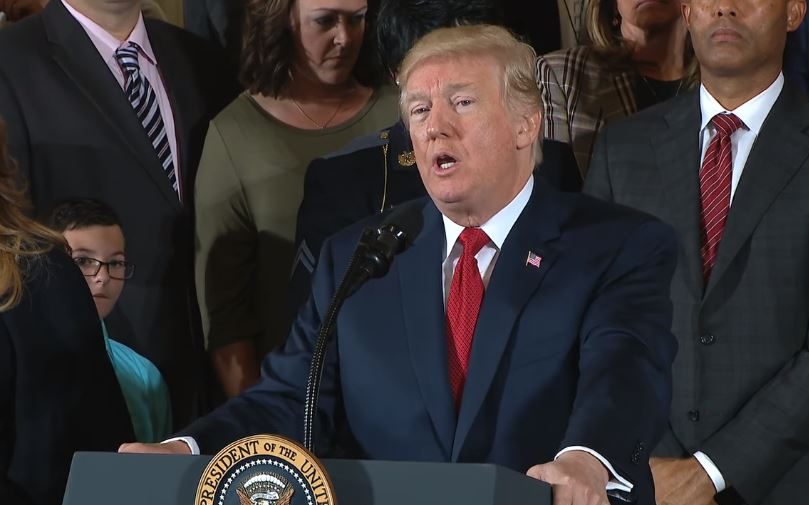
President Donald Trump took a major step in dealing with the opioid epidemic killing tens of thousands of Americans a year.
“I am directing all executive agencies to use every appropriate emergency authority to fight the opioid crisis,” the president proclaimed Thursday.
The White House speech laid out an ambitious vision of stamping out opioid addiction within a generation while treating those currently suffering.
Trump mentioned his own brother’s struggle with alcoholism, and being moved by infants born at a hospital in West Virginia dependent on opioids. But the speech offered few concrete policy proposals to aid public health officials, families and first-responders across the country.
Alaska’s Bill Walker was among six governors who were at the White House for the president’s signing ceremony.
“It had a very familiar feel to it, when on Feb. 14 when I issued a declaration of disaster,” Walker said. “I think it’s a positive thing that we’re all… we’re all on the field now.”
Walker was the second governor in the country to declare a state-level disaster related to opioids.
Supporters of the move say it helped save lives by putting thousands of units of the overdose-reversing drug Nalaxone into the hands of Alaskans and marshaled state resources to better confront addiction while curbing access to prescription pain pills.
Walker said the federal declaration could unlock more funds for Alaska or provide greater flexibility in federal rules.
“Much of what he has proposed is much of what we’re doing in Alaska already but to do it on a national basis, I think has greater significance,” Walker said.
One of Alaska’s authorities on the opioid crisis is Dr. Jay Butler, the state’s chief medical officer, who was also in Washington for the day’s events.
“What we heard today was a very high-level overview, which I think was very positive,” Butler said. “But there’s two questions. What are some of the specifics this will mean? And are there resources that’ll support some of the visionary ideals that we heard today?”
Butler hopes the declaration will prompt a supplemental appropriation from Congress to bring more money into states for treatment and prevention efforts.
One remark the president made that stood out to Butler was a reference to ending a rule known as the IMD exclusion, which bans Medicaid payments to treatment facilities that have more than 16 beds.
In Alaska, that’s been a major barrier.
Anchorage Assembly member Christopher Constant, who has worked for the Akeela Recovery center, said if it weren’t for the IMD rule they’d be able to double the number of beds at the facility.
State officials have already asked for an exemption from the policy. After Trump’s declaration today, people working up-close on substance abuse and recovery are optimistic.
Karl Soderstrom is one of the founders of Fiend 2 Clean, a program in Wasilla that helps connect people with treatment and recovery.
He described the declaration as a “really, really big deal.”
Soderstorm constantly works with people who are trying to get clean, but don’t have the money for private treatment options, and can’t get a spot in facilities that accept Medicaid.
“The majority of Alaskans that are indigent, that are homeless, that are IV-drug users, a lot of these folks meet the criteria for a residential-treatment stay, but don’t have access to one,” Soderstorm said.
Soderstrom said the president’s move opens the door for expanded treatment, and he hopes programs like his will see a trickle-down in funds if federal dollars follow.
He thinks it’s unfortunate the disaster declaration has taken so long, and pointed out that since the president first announced his intention of designating a federal emergency in August, thousands of Americans have died from opioid overdoses.
Still, for Soderstrom, this drives the issue to the front of public consciousness.
“I think it’s great news,” Soderstrom said. “I think that President Trump was really smart to put the Commission on Substance Abuse together, and I think this is just the tip of the iceberg. This disaster declaration pushes the opioid epidemic up as a priority. So now we have to do something about it.”
Both of Alaska’s senators applauded today’s move and say they’ll push for additional resources.
